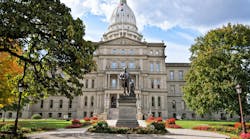The COVID-19 pandemic swept through the country, infecting tens of millions of people (and counting) in the United States alone. Although much remains a mystery about the virus, one piece of advice has echoed throughout the crisis: Wash your hands, and do so thoroughly and often. This seems a simple means of avoiding a mysterious illness. But for people without access to clean or running water, the pandemic becomes an even more deadly threat.
In the wealthiest country on earth, clean water should be a given — a resource that’s readily available to virtually all of the population. But the groups hit hardest by COVID-19 (including Black, Hispanic, and Indigenous communities) often lack access to this basic human resource.
In the Navajo Nation, for instance, more than one-third of residents lack daily access to clean, running water. Others might have only two or three gallons of water to ration each day (compared with the average 88 gallons used elsewhere in the U.S.). In Flint, Michigan, the water crisis disproportionately affected people of color and was the disastrous result of systemic injustice and a callous disregard for its residents’ well-being. Minorities are also far more likely to live near hazardous waste sites than their white counterparts. It’s no wonder that these same people have higher chances of experiencing negative health outcomes.
These health-related issues, however, aren’t limited to COVID-19 — they’re far more pervasive than they seem at the surface level.
Why America’s Water Access Issue Spans Beyond the COVID-19 Pandemic
Although this pandemic places the water crisis in the spotlight once again, this has been a longstanding public health issue that urgently demands solutions.
A lack of running water is one aspect of the problem, but pollution presents serious health threats as well. Uranium from old mines seeping into native reservations’ groundwater and industrial chemicals wreaking havoc on waterways are but two explanations for why communities near polluted water often grapple with reduced IQ scores and lower life expectancies. Likewise, poverty presents barriers to running water, as many people in low-income communities cannot afford to pay their water bills in the first place.
The most egregious aspect of this crisis? It was directly caused by discriminatory policies that left communities of color without the infrastructure needed to access the most fundamental resource for human life. (This doesn’t mention that low-income communities also gather less tax money for funding much-needed infrastructure upgrades.)
Just consider Apopka, Fla.: Following national trends in housing discrimination, the city adopted an ordinance segregating Black and white residents in the 1930s. As time passed, the city brushed off problems regarding municipal infrastructure in the city’s majority-Black south side, including issues with sewers, stormwater drainage, and home water pressure that made bathing impossible for some residents. (At the same time, similar complaints from the city’s north side were addressed favorably, while the district itself received preferential financial treatment). These problems culminated in 1981’s Dowdell v. City of Apopka, in which the district court found ample evidence of the municipality acting with “discriminatory intent” toward affected residents.
While Apopka might’ve addressed its negligence with equitable municipal utility access many decades ago, countless other towns with similar histories have yet to do the same. It’s time for them to ensure each and every resident has satisfactory access to clean, running water.
Making Strides Toward Equitable Water Access
Although improved infrastructure is crucial to solving the U.S. water crisis, this country also needs a fundamental change in perspective. Right now, water is treated as a paid service and not as a human right. Even in places where water can reach people’s homes, companies will discontinue service simply because someone didn’t pay a $32 bill.
It can take a considerable amount of time for change at the federal level. Enacting new legislation and funding sweeping lending programs simply can’t happen overnight. Where change can happen relatively quickly is the municipal sphere. COVID-19 clearly demands urgent action from municipal water providers and local governments to ensure water equity, including continuing the suspension of residential water shutoffs, establishing hand-washing stations in at-risk communities, and distributing clean drinking water. At the same time, providers must craft a plan to help residents manage their account balances and any lingering unpaid bills.
The city of Chicago, for instance, partners with other entities to implement a relief program that achieves similar aims. Besides assisting lower-income city residents with lowered rates on water and sewer utilities, its Utility Billing Relief program also offers debt relief for those who can manage reduced-rate bills for a year. And in addition to shutoff moratoriums during the COVID-19 pandemic, Los Angeles allocated $50 million in COVID-19 relief funds to certain utilities customers in order to address outstanding water and electric bill debt. It also gearing up for its Fresh Start Program, which relieves utilities debts and reassesses bill payment for lower-income residents.
Where Does the Federal Government Fit In?
All this said, the U.S. still needs long-term solutions. These include replacing inadequate tanks, repairing plumbing, and addressing pollution issues in all communities — not just wealthy ones.
Of course, it would be unrealistic to ask utilities to tackle this issue on their own: We also need government-backed financial assistance programs so no one receives water through dangerous pipes or has their water turned off simply because they don’t earn enough money to cover a bill.
The United Nations has been on board with this approach for a decade, but the U.S.’ track record is dismal: Although some local, state, and federal provisions address the water access issue, the federal government fails to recognize safe water access as a fundamental human right. The U.S. has either signed or ratified numerous international treaties implicating water as necessary for well-being, but there’s still much work to be done at home. Interestingly, it’s also likely that most Americans would be on board with this, as water access is a truly bipartisan issue.
Although this shift could seem out of their reach, municipal water providers can still take steps to nudge their country in the right direction. This often begins with governments and utilities that can collaborate on solutions at the regional level, as regional solutions would be preferred. Grant support might also exist at the state level in some cases. Organizing a regional team to have water access conversations is a great start; providers should look to include county commissioners, state elected officials, and governors’ offices as well. Creating a model is key to gathering the momentum needed to move this conversation forward.
When Water Becomes a Right Instead of a Luxury
Systemic racism and discrimination clearly created and maintained the water access problem in the U.S., meaning systemic change is needed to overcome it. However, lasting change will only occur when all Americans recognize that water isn’t a luxury. We accept food stamps as a necessity because almost everyone understands food is vital to survival. Water is equally important, yet it’s not talked about in the same way when it comes to justice and domestic policy. Until Americans stop taking water for granted — and start seeing it as their neighbors’ right — there won’t be enough outcry to cause a radical rethinking of who should receive clean water at home.
Unfortunately, water access will likely become a pressing issue for more people in the U.S. as the effects of climate change grow more prevalent in the coming decades. Again, low-income minority groups currently bear the brunt of our outdated water infrastructure. But rising temperatures and droughts and flooding will jeopardize the well-being of all Americans unless we act now — municipal water providers included. We’ll all be better off if we demand environmental justice today rather than waiting until the situation becomes more dire, making the fix even more costly.
It’s high time to start treating water like the human right it is — and inequitable water access as a public health crisis.
About the Author: Chris Shaffner is the senior vice president of the Water and Community Facilities division at CoBank, a national cooperative bank serving vital industries across rural America by providing loans, leases, export financing, and other financial services in all 50 states. Chris oversees the strategic growth and management of CoBank’s water infrastructure lending, rural healthcare investments, and rural equity funds.



